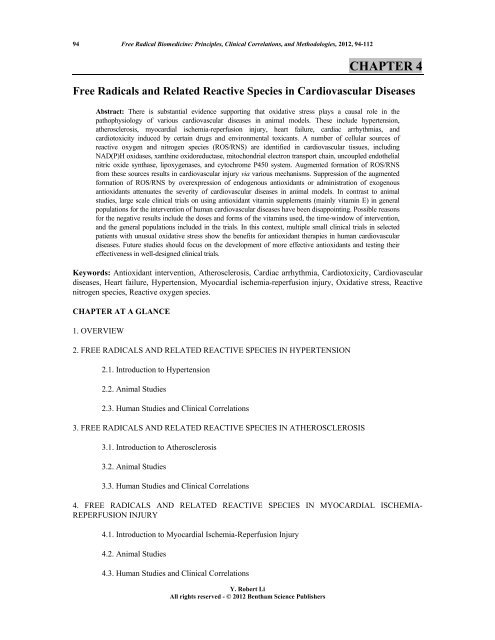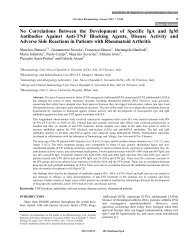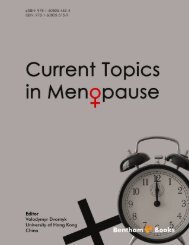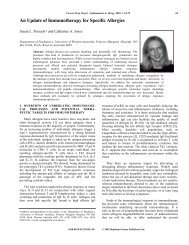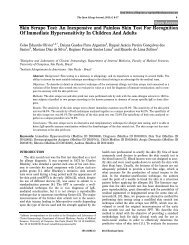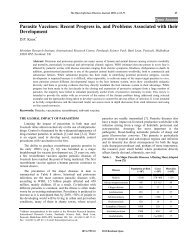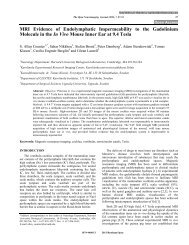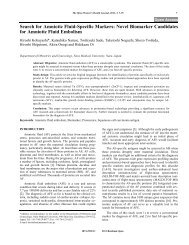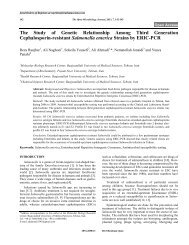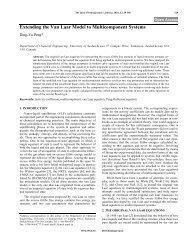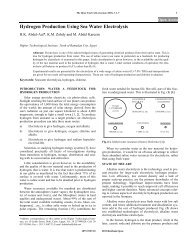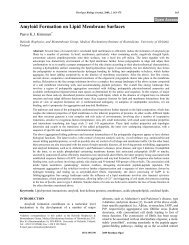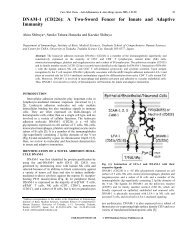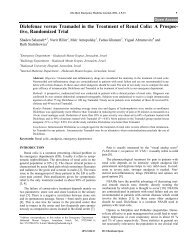Free Radical Biomedicine: Principles, Clinical ... - Bentham Science
Free Radical Biomedicine: Principles, Clinical ... - Bentham Science
Free Radical Biomedicine: Principles, Clinical ... - Bentham Science
You also want an ePaper? Increase the reach of your titles
YUMPU automatically turns print PDFs into web optimized ePapers that Google loves.
94 <strong>Free</strong> <strong>Radical</strong> <strong>Biomedicine</strong>: <strong>Principles</strong>, <strong>Clinical</strong> Correlations, and Methodologies, 2012, 94-112<br />
Y. Robert Li<br />
All rights reserved - © 2012 <strong>Bentham</strong> <strong>Science</strong> Publishers<br />
CHAPTER 4<br />
<strong>Free</strong> <strong>Radical</strong>s and Related Reactive Species in Cardiovascular Diseases<br />
Abstract: There is substantial evidence supporting that oxidative stress plays a causal role in the<br />
pathophysiology of various cardiovascular diseases in animal models. These include hypertension,<br />
atherosclerosis, myocardial ischemia-reperfusion injury, heart failure, cardiac arrhythmias, and<br />
cardiotoxicity induced by certain drugs and environmental toxicants. A number of cellular sources of<br />
reactive oxygen and nitrogen species (ROS/RNS) are identified in cardiovascular tissues, including<br />
NAD(P)H oxidases, xanthine oxidoreductase, mitochondrial electron transport chain, uncoupled endothelial<br />
nitric oxide synthase, lipoxygenases, and cytochrome P450 system. Augmented formation of ROS/RNS<br />
from these sources results in cardiovascular injury via various mechanisms. Suppression of the augmented<br />
formation of ROS/RNS by overexpression of endogenous antioxidants or administration of exogenous<br />
antioxidants attenuates the severity of cardiovascular diseases in animal models. In contrast to animal<br />
studies, large scale clinical trials on using antioxidant vitamin supplements (mainly vitamin E) in general<br />
populations for the intervention of human cardiovascular diseases have been disappointing. Possible reasons<br />
for the negative results include the doses and forms of the vitamins used, the time-window of intervention,<br />
and the general populations included in the trials. In this context, multiple small clinical trials in selected<br />
patients with unusual oxidative stress show the benefits for antioxidant therapies in human cardiovascular<br />
diseases. Future studies should focus on the development of more effective antioxidants and testing their<br />
effectiveness in well-designed clinical trials.<br />
Keywords: Antioxidant intervention, Atherosclerosis, Cardiac arrhythmia, Cardiotoxicity, Cardiovascular<br />
diseases, Heart failure, Hypertension, Myocardial ischemia-reperfusion injury, Oxidative stress, Reactive<br />
nitrogen species, Reactive oxygen species.<br />
CHAPTER AT A GLANCE<br />
1. OVERVIEW<br />
2. FREE RADICALS AND RELATED REACTIVE SPECIES IN HYPERTENSION<br />
2.1. Introduction to Hypertension<br />
2.2. Animal Studies<br />
2.3. Human Studies and <strong>Clinical</strong> Correlations<br />
3. FREE RADICALS AND RELATED REACTIVE SPECIES IN ATHEROSCLEROSIS<br />
3.1. Introduction to Atherosclerosis<br />
3.2. Animal Studies<br />
3.3. Human Studies and <strong>Clinical</strong> Correlations<br />
4. FREE RADICALS AND RELATED REACTIVE SPECIES IN MYOCARDIAL ISCHEMIA-<br />
REPERFUSION INJURY<br />
4.1. Introduction to Myocardial Ischemia-Reperfusion Injury<br />
4.2. Animal Studies<br />
4.3. Human Studies and <strong>Clinical</strong> Correlations


